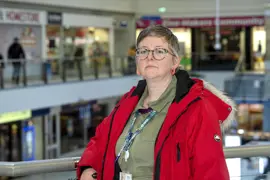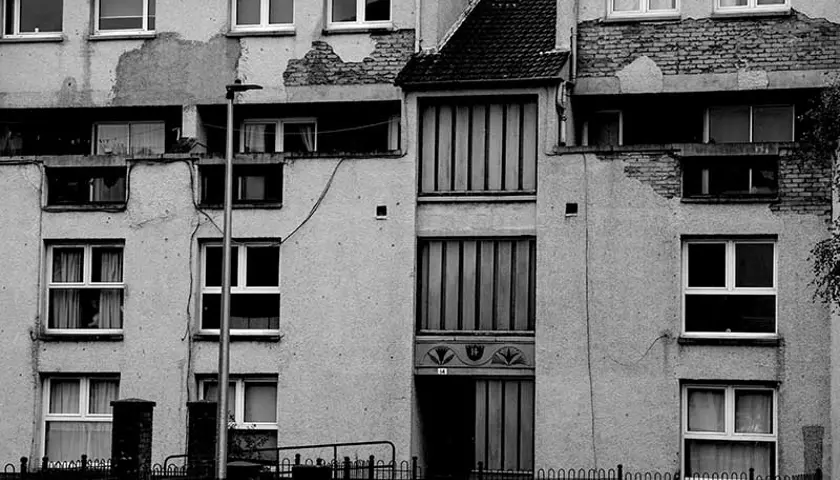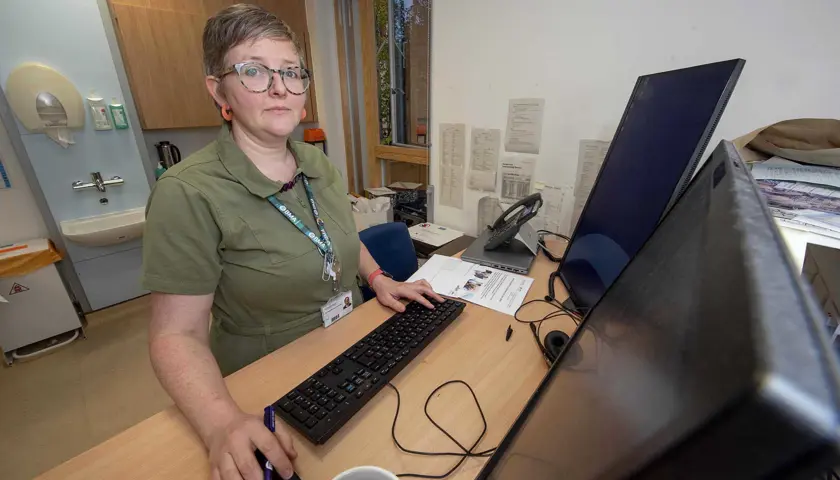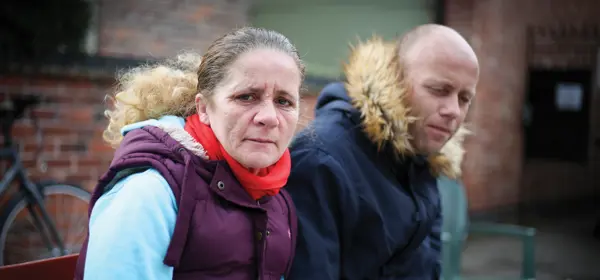
Deprivation meets inspiration
In Scotland, 100 ‘Deep End’ surgeries focus resources on the most socio-economically deprived populations in a bid to redress the inverse care law. In the first of a two-part series Peter Blackburn reports from the front line of the Deep End – this time shadowing a GP and her colleagues in Edinburgh amid a cost-of-living crisis, the fall-out of the COVID-19 pandemic and the deepening impact of austerity politics and health inequalities
Nora Murray-Cavanagh is scrolling through a morning’s worth of booked GP appointments. A daunting list – swiftly surpassing safe daily working limits even before any spare, scrabbled moments for lunch – is colour coded by urgency and stretches down the computer screen, never-ending.
This isn’t the Monday-morning madness GPs across the country have become accustomed to – and the worst of winter is likely weeks and weeks away. It is an autumnal Tuesday and, perhaps even more worryingly, the daunting length of the list is matched by the desperate need of most of those waiting for help.
In the space of just a couple of hours Dr Murray-Cavanagh is required to help a patient with severe breathing difficulties, another with a suspected heart attack, a complex pregnant urology patient, conduct reviews of cases other staff need support with, and handle a serious child-protection issue. It feels like each of these patients needs half a day with someone who cares and can make the system work for them – not just 10 minutes with a GP.
The state of the system in which doctors work in Scotland, just like much of the UK, is illustrated starkly when the ambulance service tells the suspected heart-attack patient there is no category-1 response available and to get a bus to hospital.
This might seem troubling enough in affluent areas but this is a community in which patients often cannot afford the two-bus trip to the nearest hospital, and even if they could their chaotic lifestyles or, frankly, more pressing worries such as seeing the day through with a roof over their heads can get in the way.
Intense work
In this part of Edinburgh, as with many other deprived areas, health isn’t a separate issue to employment, education and housing like many people can afford to make it. Here, Dr Murray-Cavanagh’s interactions are dominated by the wider social determinants of health.
It isn’t just bus fares either. During this morning’s consultations, patients’ health is blighted by insecure and inflexible social housing and some of those who do have a roof over their heads are being made unhealthy by the conditions they are forced to live in.
‘I think you have to not be afraid of the dark to work here,’ Dr Murray-Cavanagh says, reflecting on the intensity of each day and the needs of the community she works in. ‘And there’s not a single day where we can say “phew there is an appointment left”.’
Earlier this year, Deep End practices published a series of stories from the front line – outlining the effect of the cost-of-living crisis on patients’ lives. Each was a shameful stain on a country which can afford to do things so differently.
They tell of parents skipping meals so their children can eat but who still feel like they are failing, housing without basic washing facilities, people with diabetes swirling out of control and unable to eat nutritious food owing to relying on food-bank basics, lives blighted by panic attacks, two-year waiting lists for vital trauma psychotherapy and an overwhelming sense of hopelessness.
One patient wrote: ‘It is not just the lack of heating, hot water or food that is the issue, it is the impact of these things that has a huge negative effect on my ability to keep myself and my partner healthy, both physically and mentally.
'To provide regular washing facilities, decent food for preparing meals and to be able to plan our lives. The lack of being able to plan is very unsettling … Living without care for our welfare is a role that we can very easily slip back into and this could easily lead us back to chaotic and unhealthy lifestyles.’
It’s a whole different slice of life here
Dr Murray-Cavanagh
‘This whole narrative that people choose between heating and eating – that’s rubbish,’ Dr Murray-Cavanagh says. ‘They can’t heat. And they can’t eat. It’s a whole different slice of life here.’
She adds: ‘I could be saying to a patient “we need to address your blood-sugar control because if your kidneys, your brain and your heart are bathing in syrup for years that’s going to put you at risk of chronic kidney disease, heart attacks and stroke” – but they can’t prioritise it. Other things are more pressing. Going to a hospital clinic doesn’t happen. Change doesn’t happen.’
Dr Murray-Cavanagh – a daughter to educational activist parents from Northern Ireland who worked as the bombs went off – first became involved with inclusion health through a first-year project as a medical student with a homeless GP practice and later worked as a GP in the Scottish prison service before meeting a GP from the Deep End and then becoming involved a decade ago. Eventually she landed at the Wester Hailes Medical Practice.
Passion and motivation
The Wester Hailes Medical Practice of 2023 is in an impressive, new building, which sits next to the Wester Hailes train station and at one end of the community’s main central area – the Westside Plaza shopping centre and community buildings such as the library and job centre which gather around it.
There is an almost brutalist imposition to the concrete structures which are overshadowed by fading and peeling tower blocks, but a very real buzz of life and a reassuring lack of boarded-up windows or empty buildings. Just across the plaza, the previous practice building – a grim-looking grey shell – is the one obviously unused property and staff are understandably thankful for its place in their past rather than present or future.
Here, patients have about as good a chance of being seen when they need and hope to be seen as anywhere in the country. They will generally receive a call from a clinician on the day and then be invited to come into the practice if required or helpful.
It is a system which, like any other, cannot outsmart ultimate capacity limits but provides the best hope for this patient population whose lives can be chaotic and who need people to reach out to them rather than place obstacles in their paths. It is ‘constant fire fighting’ but even with the horrendous difficulties of recruitment and retention of staff they make it work.
‘The people who want to work here, by nature of working here, are really interesting and good people,’ Dr Murray-Cavanagh says of the practice which is run by the local health board and employs only salaried GPs. ‘People are smart, passionate and innovative around things that aren’t good enough and ask what we can do to change it. That really appeals to me.’
It may be the case that some of the goodwill that has been lost in many parts of the NHS through staff being worked to breaking point in horrendous conditions survives here, because the staff clearly feel empowered – or at least not totally stifled – by their working arrangements and inspired by the needs of their community.
On the day The Doctor visits, staff from the practice and the local hospital have joined together – very much asking ‘for forgiveness not permission’ and have launched a community diabetes outreach clinic.
The enthusiasm is palpable and a group of complex patients who find health services aloof and tough to trust have been given access to consultant, GP and nursing care where they live. It could be transformative. Dr Murray-Cavanagh and colleagues also run a similar scheme in paediatrics, which deals with a range of health issues including neurodiversity and has a CAMHS nurse attending their multi-disciplinary team meeting.
The practice hopes to start an adult psychiatric outreach clinic next year. Each seeks to overcome the problems the health system has internally and for patients by bringing together, figuratively and literally, people who care.
For all the positives on show at Wester Hailes, the difficulties of looking after the most deprived communities in 2023 cannot be hidden. Last year, Deep End GPs from across Scotland – alongside charities and community organisations – met, in a round-table meeting, to discuss the challenges of the cost-of-living crisis and how general practice can support patients experiencing financial hardship, with the link between poverty and poor health and widening health inequalities well established.
Participants covered fuel poverty, inadequate housing, food insecurity and access to health and care services amid rising transport costs – discussing how to build teams and community hubs to challenge all these issues. But those present at the meeting also noted the effect working in these environments – with ever-increasing workloads amid so much trauma and suffering – was having on staff, and agreed morale was ‘as low as it has ever been’.
Staff are smart, passionate and innovative around things that aren’t good enough
Dr Murray-Cavanagh
It isn’t hard to see why. After just a couple of hours hearing about patients’ lives and the work of doctors and other healthcare staff in Edinburgh, it is easy to feel overwhelmed by the sheer amount of need in communities, and just how far the structures and supports of whatever is left of the British welfare state are from meeting those basic human dignities. Dr Murray-Cavanagh takes a break to check if I’m OK.
We ‘must look after’ ourselves and try to keep perspective because society needs storytellers to outline the case for change and to be able to continue to do so through thick and thin, she says, just as it needs the doctors and other healthcare staff here.
Dr Murray-Cavanagh prescribes a moment of reflection at the end of every day to think of three things we are grateful for. If only GPs such as her, and the rest of the workforce, had someone who cared so much about whether they are being overwhelmed by what they are seeing.
Retention problems
To an outsider witnessing this inspirational, crucial, work on the front line, the effect of trying to care in such desolation and chaos has on the workforce is nearly as troubling as the trauma communities are living through. Together these tragedies ring an existential alarm bell for the NHS and society. Where will these people be if even the carers are no longer there?
Dr Murray-Cavanagh says: ‘It’s worse now than it ever has been – and that’s because retention of staff is such an issue. You should have a full-time GP for every 1,200 patients at the Deep End and that should be in the high 50s or 60 sessions a week, roughly, for our population. We’re sitting at about 40 and will be closer to 30 by Easter 2024 as we lose another whole time equivalent GP. It’s a leaky bucket and that is not sustainable.’
Reflecting on whether the stored-up burden of this difficult job is a worry for the longevity of her career, Dr Murray-Cavanagh, seemingly asking herself the rhetorical question, says: ‘I’m 42 – and this job is probably for another 20 years. And I’ve been doing it for 10 years…’
But she continues: ‘Fundamentally, I believe that we are a smart country and a compassionate country and there are enough smart people to engage the political change that is required. I have to believe that.’
One day in Dr Murray-Cavanagh’s practice is plenty to see the scale of the problems society faces and the reasons for hope. It is also ample evidence that investing in the NHS workforce is the right thing to do.
Images by Douglas Robertson




